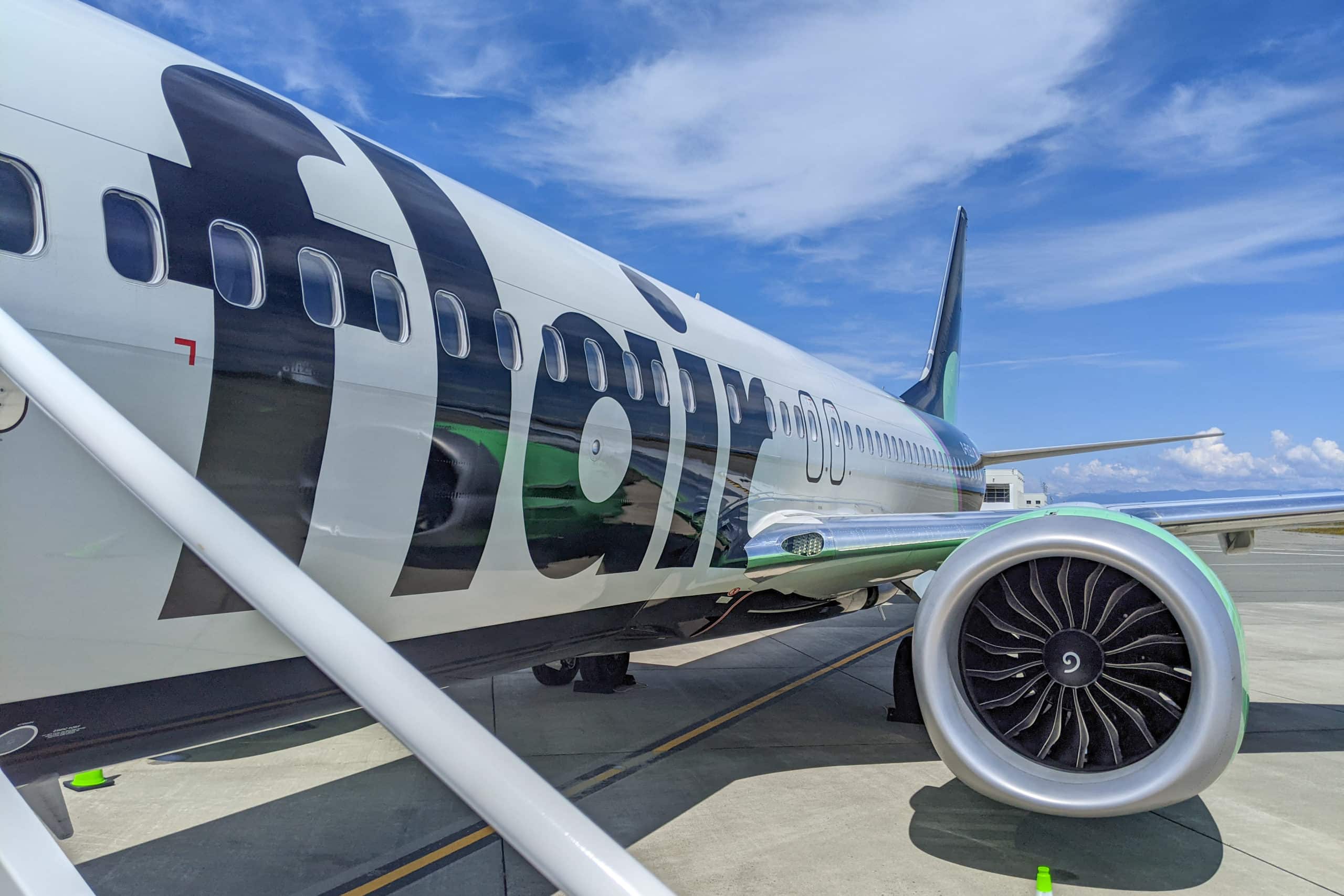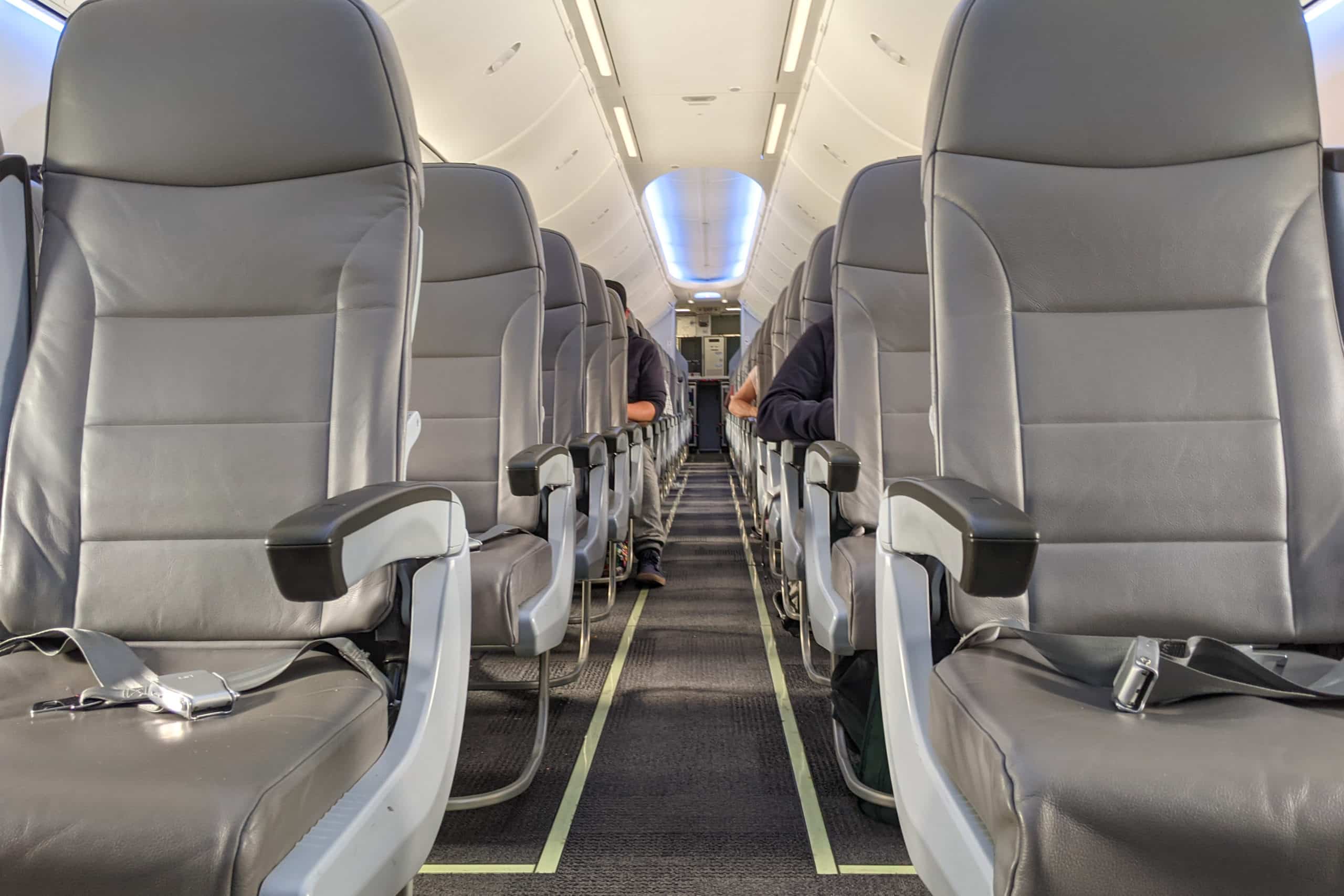Business Platinum Card from American Express
130,000 MR points
The headwinds keep blowing against the nose of Edmonton-based ultra-low-cost carrier Flair Airlines.
The relative newcomer to the Canadian aviation industry first took flight in 2017, and has since attempted to disrupt the industry by offering travellers rock-bottom prices and by flying routes to less-serviced airports.
Alas, after recent revelations regarding the airline’s need to settle a massive tax bill, it appears that all is not well at Flair.
Let’s take a look at whether Flair’s ultra-low prices have put them at an ultra-high risk of turbulence in 2024 and beyond.
Recently, it was revealed that Flair Airlines owes the Canada Revenue Agency (CRA) a whopping $67 million (CAD) in unpaid taxes related to import duties on 18 Boeing 737 MAX 8 aircraft.
Worse still, the CRA received a court order in November 2023 to take drastic action, if needed, to settle the debts. These actions are listed as including, but limited to, the seizure and sale of Flair’s assets, which could include aircraft in its fleet.
In response, Flair Airlines has reported that it has come to an agreement with the CRA to pay the taxes; however, the exact terms of the repayment plan are confidential, and haven’t been reported by either party.
Flair also tweeted to remind passengers that none of its property has been seized, and that there has been no impact to its daily operations.
We want to address today’s media coverage and be clear that the Government is NOT seizing flair property & this situation does not impact our daily flight operations. We will continue to fly and look forward to serving you now and in the future • #flyflair #flyaffordable pic.twitter.com/dXgjDgyeq8
— flair airlines (@flairairlines) January 30, 2024
These developments come less than a year after Flair had four of its planes seized due to unpaid debts.
For now, Flair appears to be shifting its focus away from growth and more towards stability by increasing passenger loads, curtailing unprofitable routes, and raising overall revenue to maintain operational expenses while also repaying the CRA.
Previously, Flair had plans to expand its fleet from 20 to 26 Boeing 737 MAX 8 aircraft in 2024; however, that has been put on hold until at least 2025.
Last week, Flair published a number of changes to its schedule, which included seasonal service on some routes ending earlier than planned, making some year-round routes seasonal, and suspending routes altogether.
This isn’t necessarily a great start to 2024, especially after a year in which the airline transported 4.5 million passengers.
Flair Airlines’s main claim to fame has been its ability to provide customers with industry-low prices for flights, which it achieves in part by charging customers a fee for food, drinks, seat selection, and any luggage beyond a small handbag.
However, the low prices don’t appear to be enough to keep the general public happy, as evidenced by the alarming number of customer complaints during the 2022–2023 fiscal year, which led to the carrier hiring a new customer service team and pledging to do better.
Flair Airlines is also faced with the fact that the entire industry has become increasingly competitive, and as more Canadians look to find low-price flight options, more airlines have sprung up to meet market demand.
For example, Porter Airlines has been rapidly expanding its network across Canada and the United States, including into Flair’s home turf of Western Canada.
Meanwhile, WestJet has integrated Swoop into its mainline operations, and will do the same with Sunwing in the future, providing low-cost offerings from its Calgary homebase and elsewhere.
Also in Calgary, upstart Lynx Air has moved to further disrupt prices as it attempts to seek an increased market share using a business model similar to Flair’s. Lynx Air is also in the process of expanding its operations throughout 2024.
This growing competition means that Flair is offering a product that, while inexpensive, is no longer unique, especially with the company’s operations based in the crowded Western Canadian market.
Despite the continued demand for the company’s services, it’s difficult to see how the airline can salvage its bottom line while also keeping its prices as low as it has.
Despite Flair Airlines facing considerable debt obligations and problematic legal battles with lessors, its senior executive leadership and its main investor, private investment firm 777 Partners, have expressed great optimism regarding the airline and its future.
To defend their optimism, Flair’s CEO and the company’s financial backers point to the fact that Flair’s prices remain at or near the bottom of the industry, and that these flights are highly sought by value-minded customers.
They also point out that the airline has greatly improved on many of its reliability metrics.

Flair is reported as having completed 98.2% of routes in 2023. Plus, it was on time for 68.8% of its flights in 2023, making it the second-most punctual airline in Canada last year, according to data from Cirium.
The company has also reported an improvement in its customer service standards, and is now ranked behind its competitors at Sunwing and Lynx Air in terms of number of complaints.
The Flair Airlines senior leadership team and the company’s main investors clearly see much potential in the airline and want to stand behind it, though it’s also possible that this is part of an attempt to drum up more support.

However, despite the company’s optimism about the future, the airline is still experiencing difficulties, and it’s worth remembering how quickly such issues can spiral out of control.
After all, it was only about 20 years ago that budget carrier JetsGo Airlines went under, with their bankruptcy proceedings playing out in dramatic fashion at the height of the 2005 March Break season.
As a result of JetsGo’s bankruptcy, thousands of travellers were left stranded in Canada and abroad with little recourse, due to the airline’s planes being grounded – a crisis which was caused by the company’s debt and its inability to secure an emergency infusion of desperately needed capital to appease creditors.
For now, it appears that Flair Airlines has weathered the disaster that was COVID-19, and it continues to vie for space in a hyper-competitive segment of the budget aviation market.
Only time will tell if the airline can continue to survive and compete; however, it remains clear that both the executives and investors at Flair are committed to seeing the airline through this latest storm.
Based on the available evidence, it’s clear that Flair Airlines is heading through some strong turbulence. The enormous bill for back taxes, the delays to expansion efforts, and the need to compete in the most competitive Canadian aviation market in history are all factors contributing to Flair’s struggles.
It’s also clear that the Flair team remains committed to offering remarkably low prices, which is a win for the consumer’s wallet.
Hopefully, Flair can right its course, since the market needs innovators and competition.
Until next time, always book your cash fares on a credit card with flight delay and cancellation insurance.
Go Flair Go! Down with WJ and AC!
I am rooting for Flair, so I’ll be following their progress with interest. The flights I’ve been on with them were convenient, cheap, and without complications (so, better than any of my latest Air Canada flights). Any option outside of flying from/through Pearson looks real good these days.
That being said… I wouldn’t book with them for a repositioning or connecting flight. Delays and cancellations from major airlines at least have more alternative flights available (even if I’ve had to wait 24h for one before). And after the troubles I’ve had, solid travel insurance was definitely at the top of my list for my latest card!
It’s true, i took them a few times, besides the delay, they r fine. Exactly what u said, dont fly with them if one has a connecting flight to catch